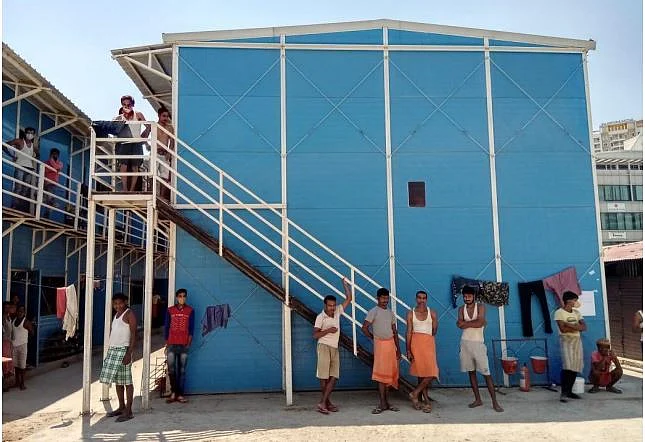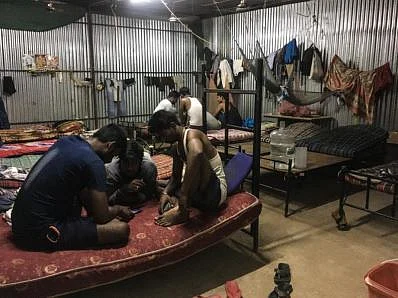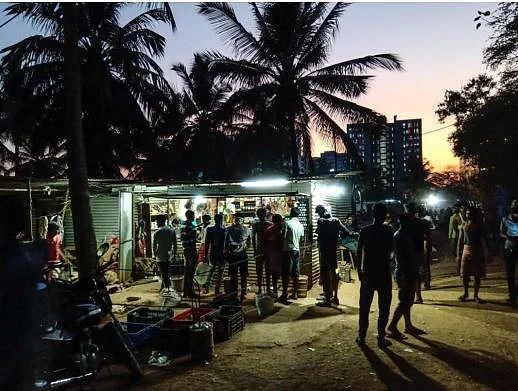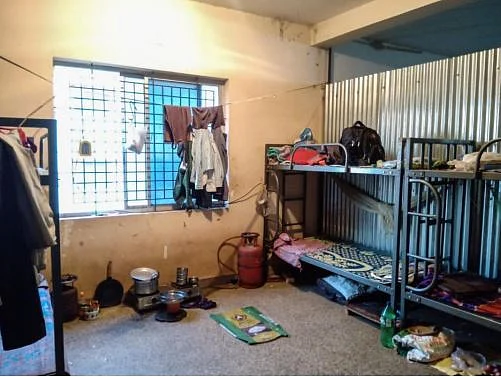Thousands of construction workers involved in building the Bengaluru Metro network are a troubled lot as they have reportedly not received any payment for the work done in the months of February and March.
Primarily migrant workers employed on a contractual basis, the outbreak of COVID-19 and the national lockdown has spelled doom for the workers. Unable to practice social distancing in the overcrowded colonies they occupy across the city, these workers from across the country and state, are now reportedly struggling for basic food and amenities.
A report by Bengaluru-based media collective Maraa states that unhygienic toilets and overcrowded rooms are the norm in these colonies housing hundreds of workers each. In many cases the contractors have gone underground, forcing workers to fend for themselves when it comes to procuring drinking water, medical supplies and groceries, all without any income.
Several of the relief measures announced like waiving of room rent, payment of full wages despite lockdown and provision of dry ration and cooked food, has not yet reached these Metro construction labour camps.
In spite of Government orders stating that companies are to pay salaries during the period of the lockdown, most workers have not been paid their salaries for the month of February and March 2020, the report states.
Workers Housed in Old Building, Tin Sheet Colonies & Tenements
According to the report, many of the the labour colonies where such Metro workers are housed lack basic amenities like clean drinking water, clean toilets and adequate living space.
“Labour colonies are spread across the city in the most obscure places - often in dilapidated buildings, makeshift rooms, which are hidden from public view. There are usually 12-20 workers in a 10X10 feet room, sometimes smaller, poorly ventilated with no storage facilities. Workers are also expected to cook in these rooms,” the report states.
After working up to 12 hours a day, 7 days a week, the workers reportedly earn Rs 13,000-15,000. In many cases, the cost of procuring rations and food is being cut from their salaries, by contractors.
Piles of garbage, power cuts, no access to sanitizers, masks etc are some of the issues faced by living in these labour camps. Following the imposition of a national lockdown on 21 March, the labourers were asked to remain within the camps, but they are yet to get access to any government supplied rations, cooked food schemes put into place by the central and state governments.
The construction of the Bengaluru Metro started in 2009 with the first phase complete. The second phase is currently underway.
Of Evictions & Extortions
According to the workers surveyed as part of the report, room owners are evicting workers over non-payment of rent.
“I paid Rs 20,000 as deposit and Rs 6,000 as rent. In-spite of this, my room owner has evicted me, because I am unable to pay rent because of the lockdown. He has locked my room, my cooking utensils, clothes and documents are inside. He refuses to open it, unless I pay him an additional Rs 8,000. Where will I get this money from? I am living with other workers in their rooms, in the labour colony. I have no clothes. I have been wearing the same shirt and shorts since the day the lockdown began,” said a worker from the labour colony in Kudlu Gate
Migrants from other states are worried about having to stay away from their families amid this public health crisis and are desperate to return home, in hope of better prospects.
“We are afraid what will happen to us and what will happen to our family. We don't want to die in a foreign land. We will stay healthier when we are with our families and loved ones. When will the lockdown end? When can book our train tickets? ” said someone from a labour camp in Electronic City.
Crowded scenes have emerged at the few ration shops catering to these colonies, with social distancing norms going for a toss. Considering that many of these labour colonies are informal settlements, the report claims that they are not under the purview of any authority, depriving them of access to relief schemes.
Demands From the Government
Given that many of these people are undocumented migrants from across the country, one of the first things asked of the government is to survey and identify the number of workers in Bengaluru, to meet their needs.
Implementation of government orders like rent waiver, payment of full wages and supply of ration free of cost.
Immediate steps to be taken to better the sanitation and health facilities at these camps and provision of gloves, masks etc for their use. Mobile recharge facilities, educational material about COVID-19 to be provided and a system to wire money back home are some of the other requirements.
“It is equally important to address structural vulnerability that has been created by the non-compliance of Bangalore Metro Rail Corporation Limited (BMRCL) and the different contractors as well as the State Labour Department for non-compliance of The Building and other Construction Workers‘ (Regulation of Employment and Conditions of Service) Act, 1996. Section 34 of this act clearly states that the employer shall provide, free of charges and within the work site or as near to it as may be possible, temporary living accommodation to all building workers employed by him for such period as the building or other construction work is in progress,” the report states.
(At The Quint, we question everything. Play an active role in shaping our journalism by becoming a member today.)



